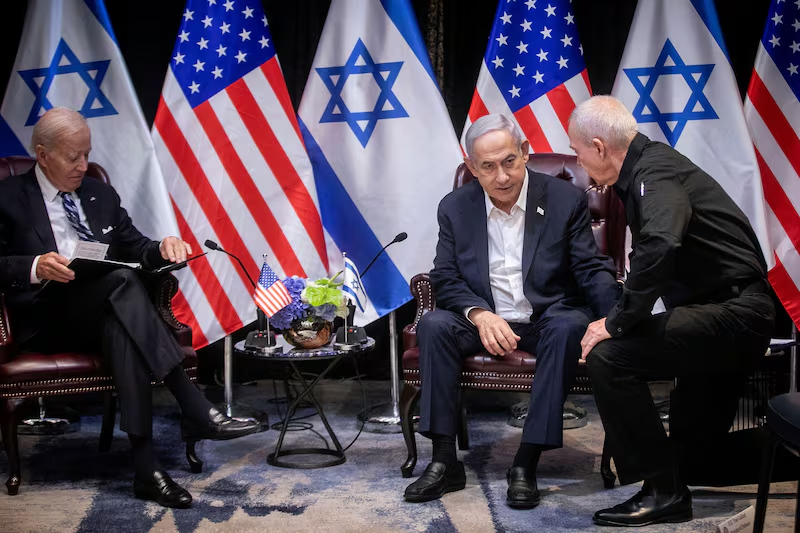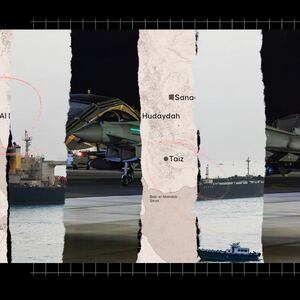The Middle East is sitting on a powder keg and the longer the tensions continue to escalate the greater chance of the region spiraling to a point where Iran and the U.S. could be drawn into a full-blown war through their respective proxies.
Iran entered the conflict directly for the first time Monday night, hitting Israeli and ISIS targets in Iraq and Syria. While U.S. and U.K. forces have carried out strikes on Houthi military targets in Yemen.
The focal point of the confrontation emanates from Israel’s bloody and brutal campaign in Gaza; critics of Israeli Prime Minister Benjamin Netanyahu are claiming that he is prolonging the war to save his own political career.
“He is worried that if the war finishes today, streets all over the country will be full of demonstrators demanding his resignation,” Ahmed Tibi, leader of the Israeli-Arab party Ta’al, told The Daily Beast.
“Netanyahu is fighting for political survival and he is willing to pay any price in order to survive. Those that say that the excesses of the military campaign on Gaza is necessary for Israel’s security are lying,” said Tibi.
When the war in Gaza ends, Netanyahu will face court over corruption charges as well as an investigation into security failures on Oct. 7 when under his watch Hamas succeeded in infiltrating southern Israel and killing approximately 1,200 Israelis, most of them civilian. “He, together with his government, is responsible for the security failure of October 7,” Tibi said. According to foreign and Israeli media reports, the Israelis failed to take seriously warnings from Egypt and Israeli intelligence that Hamas was planning an attack.

An Israeli armored vehicle convoy rolls across a road after returning from the Gaza Strip on January 15, 2024, amid ongoing battles between Israel and the Palestinian Hamas militant group.
Menahem Kahana/AFP via Getty ImagesIn response to the atrocity Israel launched its military assault on Gaza which has resulted in over 24,000 Palestinian deaths with another 7,000 missing, presumed buried under the rubble, according to the Hamas-run Health Ministry.
According to the U.N., 70 percent of those killed are women and children. Nearly 60,000 Palestinians have been injured or maimed, 1.9 million have been displaced and more than 65,000 buildings destroyed. Hundreds of Palestinian journalists, medics, U.N. workers, and hospital staff have been killed.
This has fueled anger in the Arab world, and elsewhere, and led to retaliatory attacks by Iran’s proxies and allies, the Houthis, Hezbollah, Hamas and several Islamic organizations based in Iraq.
Netanyahu has argued that the war needs to continue until Hamas is destroyed and all the Israeli hostages held in Gaza are released. But the fight to free the hostages has stalled since Israel assassinated Hamas leader Saleh Arouri, who was one of the chief hostage negotiators, at the beginning of the year. Hamas has since broken off further talks.
“Hamas will not be eliminated militarily. It is a movement with an ideology and a presence in Gaza, the West Bank, East Jerusalem, Lebanon, Syria, Turkey, and Qatar,” said Tibi.
“Even if all the leadership is assassinated the movement will continue. The situation is now very dangerous and a new war will cause swathes of destruction in southern Lebanon and northern Israel,” he told The Daily Beast.
Tensions are simmering on Israel’s northern border where an attritional, tit-for-tat exchange between Hezbollah and Israeli forces over the last few months could be on the verge of escalating into another full-blown out war between the Iran-backed Shia paramilitary organization and the Israeli state.
Hezbollah’s response has involved limited attacks on Israel’s northern border forcing tens of thousands of Israelis to evacuate their homes.
Israel in turn has carried out attacks in southern Lebanon and assassinated several Hezbollah and Hamas leaders and commandos in Lebanon and Syria.
Politicians and analysts are now fearing that although the situation on Israel’s northern border is currently contained with both sides restricting their responses, any miscalculation by either side could lead to an explosion of massive proportions.
“If the conflict in Gaza comes to a close, Hezbollah might well stop its cross-border attacks, as it did during the pause between Israel and Hamas in late November,” analysts Heiko Wimmen and David Wood argued in an article published by the International Crisis Group. “From the group’s perspective, and from Iran’s, the Gaza war’s end would render obsolete the rationale for supporting Hamas by opening an additional front.”
Israeli intelligence has further warned that the Israeli-occupied West Bank is on the verge of an explosion too and a third Intifada is highly possible with an upsurge in Israeli settler violence.

Israeli Prime Minister Benjamin Netanyahu, confers with Defense Minister Yoav Gallant, during their meeting with US President Joe Biden at the start of the Israeli war cabinet meeting, in Tel Aviv on October 18, 2023, amid the ongoing battles between Israel and the Palestinian group Hamas.
Miriam Alster/Getty ImagesMustafa Barghouti, the leader in the West Bank of the National Initiative, a Palestinian political party, told The Daily Beast that Netanyahu did not want to stop the war.
“This man knows very well that once the war stops and an investigation into his actions begins, he will be held chiefly responsible for the Israeli events of Oct. 7, the strategic failure, the political failure as well as the intelligence failure so he and Defense Minister Yoav Gallant know very well their positions will be threatened when any investigation takes place,” he said. “Furthermore, it’s more than the intelligence failure because Netanyahu is facing four counts of corruption which could take him to jail.”
He added: “So for Netanyahu it’s either the continuation of the war or jail. And if the world is worried about the Houthi attacks on ships in the Red Sea, a Gaza ceasefire would end all that as well as the other attacks from other groups in the area including Hezbollah.”
Danny Danon, former Israeli ambassador to the U.N. and member of Netanyahu’s Likud party, said he disagreed that Netanyahu was trying to provoke a larger war to preserve his political position and argued that the war on Gaza should be intensified and a ceasefire was not the way to go.
“I beg to differ with this approach. I have a reputation for speaking directly whenever I need to criticize the prime minister. I think what has happened now is exactly the opposite. Basically the prime minister and the Cabinet are moving backwards as far as the war goes and I think this is the wrong approach,” Danon told The Daily Beast.
“We have to be more aggressive and keep up the same intensity as when the war began. Many Israelis would be disappointed if there was a ceasefire. The military action taken in Lebanon and Gaza is necessary self-defense. We can’t have Hezbollah sitting on Israel’s border threatening us,” he said.
Danon did concede, however, that Netanyahu would face tough questioning when the war ended but dismissed the corruption charges against Netanyahu as irrelevant.
Yohannan Tzoreff, a former member of the Israeli negotiating team during the 1993 Oslo Accords, dismissed the assertion that Netanyahu was prolonging the war for his own political survival as “embarrassing.”
The analyst for the Institute for National Security Studies (INSS) in Tel Aviv told The Daily Beast that the Israeli public was not naive and that although they saw the war on Gaza as necessary for their survival they would not let their premier off the hook when the war ended.
“Israel is a strong, democratic country and the people would see very quickly if Netanyahu was using events for his own political advantage,” said Tzoreff.
Lior Haiat, a spokesman from the Israeli Ministry of Foreign Affairs, slammed the theory that Netanyahu was using the conflict for his own political gain.
“The assertion that Israel is trying to drag Iran into a war as well as the U.S. is outrageous. Since October 7 and 8, Hezbollah and Hamas have attacked Israel from the north and south respectively.
“Hundreds of thousands of Israelis have had to leave their homes because of these unprovoked attacks and then when we respond to these attacks we are accused of provoking the wars,” Haiat told The Daily Beast.
Mairav Zonszein, an analyst with the International Crisis Group, said that if Netanyahu truly wanted to “deradicalize” Gaza he would be going about it in a very different way, which would try to bring calm to the region rather than stoking further tensions.
“Any serious effort to “deradicalize” Palestinian society would start by demonstrating respect for and taking practical steps to enable Palestinian political, economic and social aspirations,” Zonszein argued in an article published in The National.
“First and foremost, it would agree to a ceasefire in Gaza since it is hard to imagine anything more radicalizing than seeing one’s home and community destroyed and one’s family killed.”








